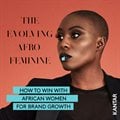Each edition of Kantar’s Africa Life study dives into the scale of detail with more depth, more insights, more opportunities. This time around, we celebrate the inclusion of South Africa in the mix with Kenya, Nigeria, and Senegal.
This results in more focused growth themes and trends, based on the shifting sands of the true colours of the continent and its underlying backbeat.
This sparks new perspectives for Afro-enthusiasts to explore the insights that businesses and brands need to activate in order to win better and faster in Africa.
That’s why we held more than 3,500 conversations with urban consumers across Africa including Kenya, Nigeria, Senegal, and South Africa. While the essence and potential of Africa is impossible to capture within these limits, what is portrayed is the spirit and energies that drive the people in our region, while looking into what’s next.
One of my favourite African storytellers says the person who does not have the ability to project themselves in the future will not find themselves there.
So, looking beyond the immediate data to envisage what’s next is at the heart of the study, because we are no longer working in the same ways as we did just two years ago, with accelerated patterns and shifts in our behaviours, consumption patterns, decision-making and expectations.
Shifts are taking place everywhere, revealing new truths by creating new intersections with how people live.
It is these intersections that hold the most exciting opportunities to serve differently, deliver, and positively impact the lives of consumers and businesses. It is at these intersections that growth will happen.
We obsess about tech, which is in the hands of African people, and ‘identity culture’ as a massive opportunity, as these both trigger and shape most of the shifts and new energies in play today.
Case in point: the internet has become the top enabler for what people do, from shopping and consuming to entertainment, education and higher aspirations triggered by the possibilities Africa offers the world.
For example, did you know that women lead internet growth in Africa?
There’s a question mark on the pandemic’s role as the driver of this as half of all urban women in Nigeria were not yet connected to the internet. Today, 72% of women in Nigeria regularly connect to the internet.
So, while men are more connected than women in absolute terms and tend to do more activities online than women, the fairer sex leads on e-commerce activities. This includes buying products or services online with females at 130 to males at 91, as well as over-indexing on blogs and forums (females 115: males 93), taking educational courses (females 118: males 92), and watching both free (YouTube, TikTok – females 105: males 98) and paid video content (Netflix – females 156: males 82).
This shift intersects with four of the top trends on the continent right now: Inner lanes, Social Commerce, FunTech, and Equal Voices.
Equal Voices is all about the tension and drive towards equality, both as the right thing to do and as a business imperative. We need to reconsider deeply rooted stereotypes and clichés on gender differences, like online betting being dominated by males. Look at new territories that challenge and redefine classic ways of connecting with people, have conversations on what it means to be a woman today and devise more successful digital strategies and better connecting with women in Africa, both online and offline.
Watch out for our follow-up deep-dives into the 4 specific intersections of the changing dynamics of the African marketplace in the informal sector opportunity; the education and unconventional ideas opportunity; the culture, social commerce and tech opportunity; and the entrepreneurship and human capital opportunity.
Find out all about Africa Life here. With a focus on understanding the youth and the women of Africa. Missed the live launch? Register here to watch the hour-long brand learning session on demand.
